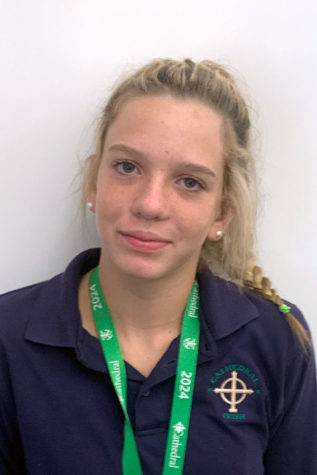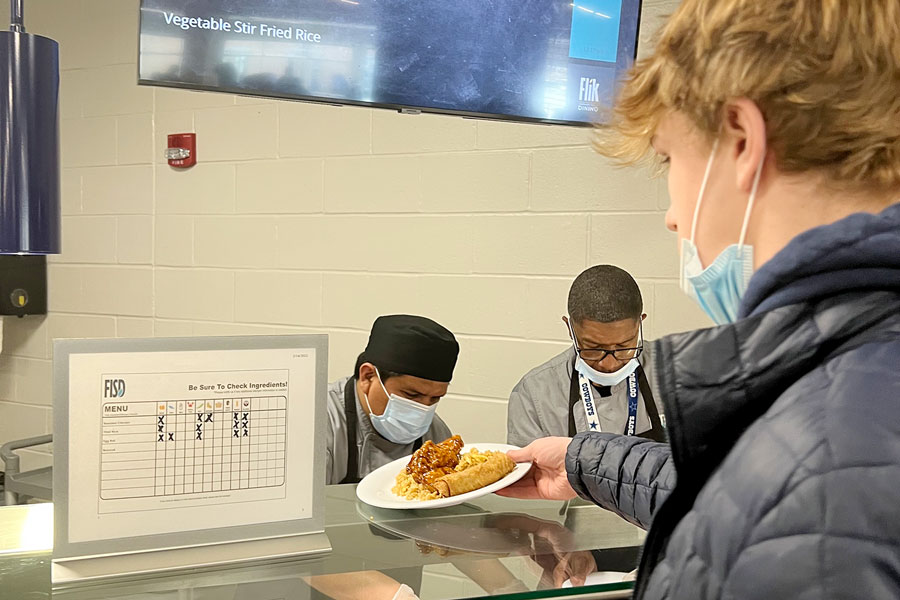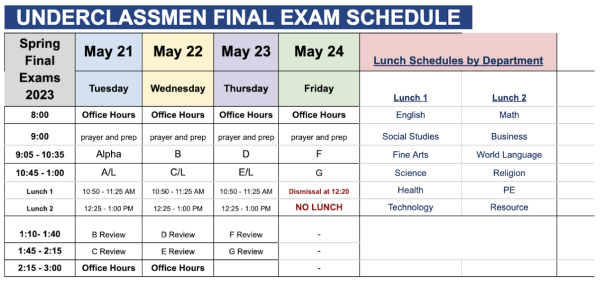Dining hall staff ensures food allergy safety
Students receive information to make good choices
In the dining hall, a student makes his selection for lunch. While the FLIK staff ensure that students are informed about potential food allergies, it is up to students to make selections in order to avoid menu items that would expose them to such allergies.
The school is in partnership with FLIK Independent School Dining with the addition of the new dining hall and Innovation Center, and staff members do their best to ensure that students with food allergies are informed of their options.
Chefs and dining management makes a strong effort in this area to not have cross contamination occur, resulting in allergic reactions. “We do our best to provide all of the information to students via our online portal and at our (lunch) stations, with the sign with an “X” on it, which will indicate if a product has nuts, tree nuts, soy, wheat, gluten, etc,” said food service director Mr. Kevin Cairns.
The lunch offerings are not completely free from allergies, but different stations have different options for students. If a student has an allergy, it is their responsibility to make decisions and lunch choices. The different lunch stations have their ingredients shown and possible allergies. Most are also marked with an “X,” meaning that nuts, soy, wheat and gluten could be present in the food.
FLIK and lunch staff are not aware of the specific students with allergies. “As long as these people are reading and looking at those things, our lunch is allergy safe,” Cairns said.
The stations in the dining hall are customizable, which allows students to choose and leave food off based on their preferences and allergies. For example, the salad and sandwich station is customizable and allows students to choose what they want included in theirs.
School nurse Mrs. Marianne Vogt ‘83 noted the importance of students bringing their lunch instead of buying. There is always a chance that the ingredient is in the food but not listed. By bringing their lunch, they are able to make sure what they eat is completely safe for them.
“The most safe thing when you have a severe food allergy is just to bring your lunch. It’s a personal responsibility,” said Vogt.
It is not a federal or state law to have allergy safe options in school cafeterias, but most schools do take precautions. Vogt has experience working in elementary schools, where they had to worry more and take more precautions for the younger students. They had to be more careful because younger students are not as responsible as those in high school. She also reviews the lunch menu with families concerned about lunches.
There are certain foods that the lunch workers do not prepare next to each other in hopes not to cross contaminate. “We try to keep everything separate and not cross contaminate either surfaces or food,” Cairns said.
Students being held to the responsibility of knowing what they can and can’t eat helps to show them the reality for the future. Vogt noted that if students are cautious about their allergies now, then they know to look out for them in the future. If students are helped and rely on others, then they are not being prepared for the real word.
“We make a care plan that tells us what we are going to do if they somehow ingest the food, and what the first steps would be. Their doctor makes an order and we have that written out,” she said. This allows for them to know what to do in the event of it happening.
In case of emergencies and reactions, the school does have Epipens available for use. Vogt recommends that students affected also carry an EpiPen and Benadryl with them at all times. In the event of an emergency, teachers are aware of the allergies and alert the nurse for help.
Both Vogt and Cairns noted how difficult it is to have a completely allergy safe cafeteria. Vogt also shared the importance of not assuming it’s allergen free and to be skeptical.
Vogt said, “If you made every cafeteria safe, they go through their whole life thinking everything is fine to eat, that kid has never learned. They think every food is safe. The more they learn to protect themselves, the safer they are in their whole life.”

Caroline Schilling is the Megaphone Executive Editor and a Cathedran photographer. She has been on Megaphone staff since her freshman year. Caroline is...

Macy Llewellyn is a sophomore and photographer for the megaphone. She cheers and plays lacrosse at Cathedral. In her free time she likes to bake, hangout...












